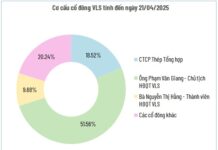New Land Ownership Regulations Impact Project Development
According to lawyer Pham Thanh Tuan from the Hanoi Bar Association, the 2024 Land Law only permits investors with the right to use “residential land” or “residential and other land” to change the land use purpose for commercial housing construction projects.
However, Resolution No. 129/2024/QH15 of the National Assembly on the Law and Ordinance Construction Program in 2025, adjusting the law and ordinance construction program in 2024, does not include the consideration and passage of the draft resolution on piloting the implementation of housing projects without “residential land.”
When the 2024 Land Law takes effect, the real estate market is expected to witness only commercial housing projects as urban area construction projects and rural residential area projects formed through the state’s land retrieval.

Bottlenecks remain as the three real estate laws take effect from August 1st. (Illustrative image)
This regulation leads to the stagnation of production and business projects (for example, tourist areas and production and business areas that have been adjusted by the state for land use planning to become residential land and urban planning to become commercial housing) due to the inability to implement the adjusted planning, resulting in a waste of state budget in planning and adjustment processes.
” The goal of the regulation requiring ‘residential land’ for housing projects that lawmakers aim for is to limit the conversion of agricultural, production, and business projects into commercial housing; more profoundly, it aims to prevent budget leakage caused by changing the land use purpose of projects without auctions. ” Mr. Tuan emphasized.
Mr. Tuan argued that preventing state budget leakage in implementing commercial housing projects lies in the accurate land price determination by competent authorities, rather than in the investor selection step.
A project with an auction but an inappropriate land price determined by the competent authority will also cause budget leakage. Conversely, a project with an approved investor but an accurate land price when changing the land use purpose will not result in land use fee losses.
Sharing the same view, the Ho Chi Minh City Real Estate Association (HoREA) also stated that the number of commercial housing projects with 100% residential land, meeting the regulations, accounts for less than 1%. Meanwhile, projects involving both residential and other land types make up 95%. Therefore, it is necessary to allow investors to transfer agricultural land suitable for land use planning to carry out projects, provided that they obtain approval from the provincial People’s Committee.
Land Price Determination Remains a Risky Issue
Another “bottleneck” pointed out by lawyer Pham Thanh Tuan is that the new regulations on real estate valuation or determination have not brought about a “breakthrough” in practice. The amended Land Law still prescribes the method of determining specific land prices based on previous regulations (excluding the land price determination by the subtraction method).
” However, land price determination remains heavily influenced by the subjective judgment of the valuers; their judgment depends on the position, purpose, advantages, timing… of the valuation to introduce the adjusting factors in a qualitative manner, based on the percentage (%) of the value of the comparable asset to derive the absolute adjustment value. ”
The assessment and perception of the competent authority in determining land prices and the post-inspection units (such as inspectors, auditors, or investigative agencies) may differ when comparing and collating, easily leading to conclusions about budget leakage in land price determination. ” Mr. Tuan evaluated.
In this context, according to Mr. Tuan, the “safe” solution for valuers is to determine higher land prices to avoid being accused of causing budget leakage. Thus, the method of determining land prices is essentially based on an old foundation, and even with adjustments to suit reality, it is challenging to expect significant changes.
While determining specific land prices in real estate projects may have improved somewhat, it can still be a “bottleneck” if the fear of making mistakes and the responsibility of the executors does not improve.

Land price determination remains a risky “unknown” for enterprises. (Illustrative image)
The unpredictability in determining land prices can easily push new market entrants into a “broken formation” if they lack financial capacity and cash flow.
” When the land use fee is determined to be high, it is one of the main reasons real estate businesses, especially those new to the market, encounter difficulties or even heavy losses. ”
If they cannot “manage” the finances to pay the land use fee, the enterprise falls into a dilemma: voluntarily returning the land to the state to “erase” the debt is not an option, and continuing the project is also impossible due to the lack of construction capital. ” Mr. Tuan analyzed.
Auction Results May Be Canceled Due to Delayed Compensation Fund Allocation for Resettlement
An essential new point in Clause 8, Article 126 of the 2024 Land Law stipulates that if the winning investor or the economic organization established by the winning investor does not allocate enough capital within six months from the date of receiving the request of the competent authority to implement compensation and support for resettlement, the auction results will be canceled.
However, according to lawyer Tuan, the cancellation of auction results as mentioned above may also raise some legal issues regarding the consistency between the 2024 Land Law and the 2023 Bidding Law and the difficulties and problems that enterprises implementing real estate projects may encounter when applying this new regulation.
Specifically, according to the Bidding Law, there is no case of auction cancellation due to delayed allocation of capital for site clearance.
In reality, for projects using land on a large scale, with phased investment progress, the land retrieval progress is also divided into several corresponding phases.
” So, with projects that have decisions on land retrieval in many different phases (periods), if the enterprise allocates enough capital in the previous phases but only delays allocating capital for compensation and support for resettlement in one phase, will the entire result of investor selection for the entire project be canceled? ” Mr. Tuan asked.
According to Mr. Tuan, resolving the legal consequences in such cases is extremely complex and creates many difficulties. Therefore, enterprises that are investors in projects involving land use need to anticipate this new legal situation related to the consequences of delayed allocation of capital for compensation and support for resettlement and prepare financially to avoid the risk of auction cancellation.









































